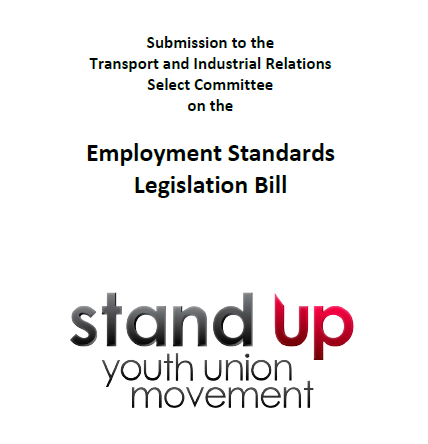
19 Apr Submission on the Employment Standards Legislation Bill
This is Stand Up’s written submission to Parliament on the Employment Standards Legislation Bill. Stand Up also gave an oral submission. Following thousands of submissions from the public and a strong campaign, the proposed law was changed and zero-hours contracts were banned.
Download a pdf of the submission here.
1. Introduction
1.1. This submission is made on behalf of Stand Up, the representative structure within the New Zealand Council of Trade Unions Te Kauae Kaimahi for workers aged 35 and under. Stand Up represents tens of thousands of young workers who are also union members across New Zealand.
1.2. Stand Up endorses the submission of the New Zealand Council of Trade Unions Te Kauae Kaimahi but is making its own submission in addition as the Employment Standards Legislation Bill (the Bill) will disproportionately impact on young workers.
1.3. Stand Up can be contacted in relation to this submission through co-convenor Asher Wilson-Goldman at nzstandup@gmail.com.
1.4. Stand Up wishes to make an oral submission to the Committee in relation to the Bill.
2. Parental Leave
2.1. The changes proposed to parental leave are welcome.
2.2. Young workers are more likely to be experiencing insecure work – including, but not limited to, fixed term, casual, seasonal and part-time employment. This has previously made it difficult for workers in this age bracket who become parents to be able to access the same level of entitlements as older workers.
2.3. Tying parental leave to employment, rather than any particular employer, will result in it being easier for these young parents to be able to spend quality time with their children at an age when forming strong parental bonds is crucial for development.
2.4. Many problems still remain with the parental leave system, however.
2.5. The short nature of the leave is still yet to be adequately addressed – the staggered extension of paid parental leave to 18 weeks is a start, but is still insufficient.
2.6. The ability of those returning to work to be able to have flexible working arrangements also requires strengthening. While the recent changes to allow all workers to request these arrangements was welcome, many workers are still unaware of their rights in this area and the balance of power when making requests is still weighted significantly in favour of employers.
2.7. The maximum weekly payment during the paid parental leave period has also fallen significantly in value since the introduction of paid parental leave in 2003, to a level well below the minimum wage for a forty hour week. We submit that adding this additional financial burden to new parents at a time when they will be adjusting to the significantly increased living costs of having a child is unfair, and recommend an immediate lift in the cap, ultimately aiming to match earnings prior to taking parental leave.
2.8. As with any change to employment law, leaving the onus on employers to inform workers of their changing rights will leave many workers in the dark. We submit that the Ministry of Business, Innovation and Employment should be funded to run both general and targeted advertising and education campaigns, in particular relating to employees on seasonal and casual contracts, to ensure that no new parent misses out on the parental leave to which they are entitled.
2.9. Keeping in touch days are a welcome addition, and will hopefully help to end the needless punishment of workers who have tried to be helpful to their employer (or fellow workers) during a period of parental leave. Much care needs to be taken, however, in ensuring that workers are not pressured into having a keeping in touch day by their employer, including education of their rights upon taking parental leave, monitoring by MBIE and significant penalties for employers who are found to have coerced workers in this regard.
3. Insecure work and the future of zero hour contracts
3.1. Thanks largely to the work of members of the Unite and First unions, particularly younger workers, the issue with zero hour contracts came to public prominence and across New Zealand tens of thousands of people took action in a variety of ways to express their opposition to unfair employment arrangements.
3.2. This Bill is part of the Government’s response to this outcry. Action was promised, and the public was led to believe that the Government would introduce legislation that would see an end to zero hour contracts.
3.3. The Bill as it currently stands does not do this – instead, it provides a firm, explicitly legal, way for employers to demand insecure work from their workers. This Select Committee has a chance to put this right – to live up to the expectations of the tens of thousands of people who publicly demanded an end to zero hour contracts.
3.4. Young workers are disproportionately affected by zero hour contracts. Stand Up affiliated unions represent thousands of these workers, and they are very clear that these sorts of employment arrangements do not work for them, and they would not be in them if they had a choice.
3.5. Collective bargaining can help – a number of workplaces have clauses in their collective employment agreements that make explicit a minimum number of hours, ways in which additional hours will be allocated, and giving preference to existing staff for additional hours over recruiting new people.
3.6. Most New Zealanders, however, are not covered by collective employment agreements, and this is unlikely to change in the near future. It is the role of legislation to set certain minimum employment standards that protect all workers, regardless of their industry, their age, or their union membership status.
3.7. The current legislation is failing young workers, often leaving them with no choice except for insecure work, which prevents them from living fulfilling lives or fully participating in our society. The Bill as it currently stands would make this situation worse.
3.8. Young workers are told at almost every stage that they aren’t important, and they can be thrown away if they cause any trouble. 90 day trials, youth rates and zero hour contracts are all ways of making sure that young workers know they are expendable. This sends precisely the wrong message to people at the start of their working lives, and will impact on their relationship with work from then on.
3.9. We have an opportunity to send our youth a strong message that they matter, that they are a part of society, not apart from it, and that their participation is welcome. Having positive work experiences, feeling valued and having it known that their opinion counts will have positive spin-off effects beyond the workplace, into engagement with local communities, participation in our democratic process and more.
4. The myth of the demand for flexibility
4.1. In discussions around zero hour contracts, proponents frequently cite a desire for flexible work (particularly amongst young workers, and women with children). While research shows that this desire exists, it is not unqualified, and the preconditions on this desire for flexibility are worth noting.
4.2. Above all, flexibility must go hand in hand with security – it should never be seen as a trade-off between the two. When you have job security, you know week to week that you will be able to work enough hours to earn enough money to pay your rent and bills, to buy the food you need, and to live the life you want. Once you have that security, flexibility is great. Choosing to work a little less one week and a little more the next suits many people, but it only works where even on the quieter weeks you know you have a guarantee of enough income to live.
4.3. Where you don’t have that guarantee, flexibility can be a curse. A constant struggle to find enough income to survive adds significant stress (which contributes to poor mental and physical health, and ultimately increases demand on the public health system). It also makes it harder to live a good life, as workers cannot reliably know when they will be able to socialise due to always needing to pick up extra work.
4.4. For parents, this lack of security is even harder. The added complication of childhood routines, and the need for (often expensive) childcare, means parents without job security cannot have the same levels of flexibility and can have even bigger problems simply finding enough work to survive.
4.5. Insecure work leads to an increasing use of state benefits, as they at least offer a minimum (albeit grossly inadequate) security of income. The sheer time, energy and stress it can take to cobble together enough work to survive when you don’t have guaranteed hours can make welfare seem increasingly attractive.
4.6. Young workers have not grown up in a climate of secure work. The old traditions of a job-for-life are long gone, and even formerly stable careers like public servants have been thrust through dozens of restructurings and a huge increase in the use of fixed-term contracts. For many workers under 30, this is all they have known.
4.7. The combination of growing up thinking insecure work is all you’ll ever have, coupled with the significant power imbalances between employer and worker, create a situation where the relationship between worker and workplace is a transient one.
4.8. A transient work relationship results in a less fulfilling work experience, a less productive worker, and less use of training and professional development, which ultimately make workers’ lives poorer while also being bad for the economy as workers are not given support to increase their skills, and are stuck in lower quality jobs.
4.9. We can have both secure work and flexible work. Seeing the two as opposites that must be traded off against each other is untrue. A different viewpoint, one that recognises that security is a prerequisite for flexibility, would see zero hour contracts banned, and would ensure the nature of the employment relationship is one that allows workers to retain their dignity while ensuring that their needs have equal voice with those of their employer.
5. What Stand Up would like to see
5.1. The specific changes we would like to see are better noted in the submissions of the New Zealand Council of Trade Unions Te Kauae Kaimahi (NZCTU) and the Young Workers Resource Centre (YWRC).
5.2. In particular, we endorse the YWRC’s suggestion of half-time pay for cancelled shifts. A significant cost like this would ensure that shift cancellations are not made lightly, while still allowing employers to use them when absolutely necessary.
5.3. We also wholeheartedly endorse the calls for the scrapping of exclusivity clauses. No worker should be told that they cannot look for additional work where it doesn’t interfere with their other job. This is particularly abhorrent when coupled with the ability to not have minimum hours – in effect, a worker could have no hours in any given week but be barred from seeking alternative employment, and thus prevented from being able to earn at all. The changes to the current drafting suggested by the NZCTU would resolve this issue.
5.4. The suggestion by the NZCTU of a 21% casual loading also appeals as a method to make casual work less unappealing. As noted by the NZCTU, the current system of only loading annual leave into casual rates of pay means that workers on casual agreements are subsidising the employer, and creating an incentive for employers not to hire permanent staff. That said, there are situations where casual agreements are appropriate. A 21% loading would go quite some way towards fixing this, removing the incentive for employers to hire casuals and create a situation where permanent work is the norm.
6. Contact details
6.1. As previously noted, Stand Up wishes to make an oral submission to the Transport and Industrial Relations Select Committee on this Bill.
6.2. Asher Wilson-Goldman, Stand Up co-convenor, can be contacted at nzstandup@gmail.com.

No Comments